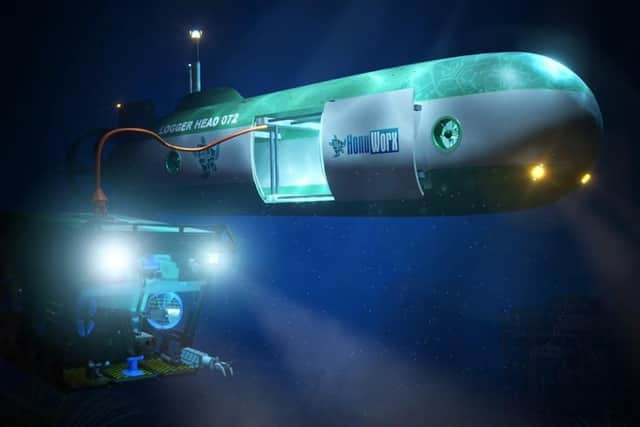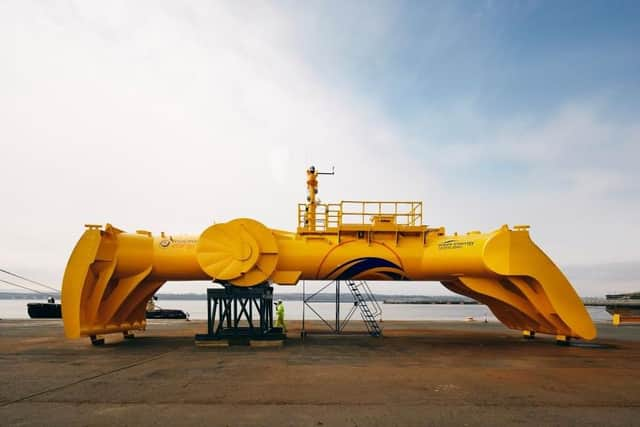North Sea: The new chief of Scotland's net zero hub on why use of oil and gas can't just be switched off
Intensive burning of fossil fuels over the past two centuries is blamed as the key factor driving modern-day climate change, generating massive quantities of greenhouse gases and pushing up global temperatures.
So is there a place for the offshore sector in a more environmentally friendly world? Yes, according to the new leader of Scotland’s Net Zero Technology Centre (NZTC), and Scotland is well placed to make the most of the opportunities.
Advertisement
Hide AdAdvertisement
Hide AdMyrtle Dawes, a chemical engineer with 30 years of experience in the energy industry, is taking over as chief executive of the Aberdeen-based tech hub. She says she believes engineering and innovation can help tackle the climate crisis, and the North Sea will play a big part in achieving a greener and more sustainable society.
It’s unlikely there will be “a silver bullet” to replace fossil fuels, she admits. A range of solutions will be required.
“In a petrol station there are three pumps you can use, but the energy system will move to something more like a supermarket, where there are many aisles you will need to visit,” she says.
New, state-of-the-art technologies, coupled with skills training and investment, will be central to the “green transition”, she says, and Scotland can be a key player.
Oil and gas use will continue for “quite a while”, she feels, but must be made cleaner. Trials are already under way to make that happen – such as using wind power or hydrogen to power production.


Other measures will also be needed, and this is what the NZTC aims to help realise.
“I’m really optimistic,” Ms Dawes says. “Don’t listen to the doom and gloom. There are challenges, but when I used to work in oil and gas you just went on and engineered and developed the technology needed to tackle obstacles.
“I think if we maintain that spirit we can actually solve some of the big problems.”


Advertisement
Hide AdAdvertisement
Hide AdThe NZTC was set up in 2017 as part of the Aberdeen City Region Deal, with £180 million of UK and Scottish government funding to be the go-to technology hub for the North Sea energy industry.
A not-for-profit research and knowledge company, its mission is to inspire, accelerate and fund technology innovation, co-investing in industry-led projects that take new inventions from concept through to deployment.
The centre works closely with developers, providing finance, identifying match-funding, co-ordinating field trials and helping to get projects adopted by industry.
It collaborates on projects covering a wide range of technologies, including wind, wave, hydrogen, carbon capture and storage (CCS), robotics and geothermal energy, as well as oil and gas decarbonisation and decommissioning and emissions reduction schemes.


It has already been involved in more than 175 field trials of innovative technology, with 33 concepts taken to market and 45 start-up businesses accelerated.
The organisation is also due to set up the cutting-edge new National Geothermal Innovation Centre later this year, a centre of excellence dedicated to exploring the potential of heat energy beneath the earth’s surface.
Ms Dawes, who was born in the West Midlands and grew up in London, was one of the first women to go offshore in what had traditionally been a man’s world.
She has worked both in the front line of oil and gas production and in customer services, so has a broad understanding of the energy sector from both sides and “empathy” with householders.
Advertisement
Hide AdAdvertisement
Hide AdClimate change is “a societal issue”, she insists, and everyone has a role to play and changes they will need to make to help cut environmental damage.
She is often asked how the NZTC can be both supporting and working with oil and gas and simultaneously working towards net zero climate goals.
“Of course it’s a transition,” she says. “And it’s not just a transition from a technology perspective, it’s a transition for the skills and the jobs and for how money is invested, especially because things are new.
“And it’s going to be a transition for the customers and people at large, and that’s what we’re part of.”
She adds: “I think if we can all work together and actually create things locally, we will all be in a much better place. Both the pandemic and the recent geopolitical issues have showed that we do need to have local resilience, and I hope that isn’t forgotten as we go forward.”
Comments
Want to join the conversation? Please or to comment on this article.